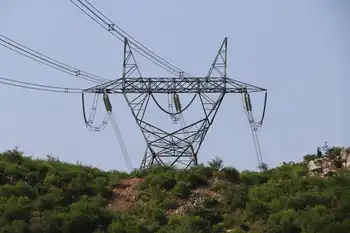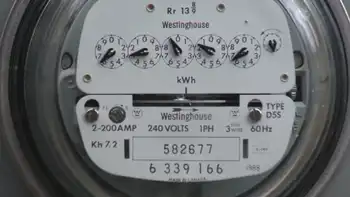BC Hydro off-book millions questioned
By Nanaimo Daily News
Substation Relay Protection Training
Our customized live online or in‑person group training can be delivered to your staff at your location.

- Live Online
- 12 hours Instructor-led
- Group Training Available
In a letter made public at a B.C. Utilities Commission hearing into Hydro's application for rate increases, Russ Jones, assistant to the auditor-general, says he is focusing on Hydro's so-called regulatory accounts and deferral accounts.
The accounts cover off-book matters such as the cost of electricity imports and the cost of reaching accommodation with first nations. Such issues would result in highly volatile electricity rates if they were included in the utility's annual budget. The Utilities Commission permits Hydro to use the accounts to fund certain current expenses from future revenues. There are dozens of such accounts.
In a letter dated March 3 to Hydro president David Cobb, Jones says he wants to know the effectiveness of Hydro's stated objective of recovering the money from future revenues without passing on an undue financial burden to ratepayers. Hydro's budget forecasts the total balance of its deferral accounts in 2011 at $879 million, up from $584 million in 2010.
Jones says the audit is to explore issues such as the time period for recovering expenses, including the cost of imported energy.
Hydro's revenues depend largely on the volume of water it can use to generate electricity. Those revenues can fluctuate depending on the vagaries of rainfall and snowpacks. It relies on imported energy when its reservoirs cannot generate enough power to meet demand. However, those costs are excluded from the budget as Hydro maintains that one or two years of above-average precipitation will allow it to pay off the account.
All Hydro's deferral and regulatory accounts fall under the mandate of the B.C. Utilities Commission and are created to generally smooth electricity rates to consumers or, as in the first nations account, pay the account off over a longer period of time. They are all public documents submitted to the commission and approved by the commission.
Jones states in the letter that Doyle's office wants a broader public understanding of the accounts, how and why they are used and their impact on Hydro rates.
"The objective of this audit project is to determine whether the recovery or refund period... is effective," Jones writes.
The auditor-general will be using a four-to-six year payback period for most of the accounts and examining them to determine if today's production and consumption of electricity is sustainable. Hydro has stated in previous submissions to the Utilities Commission that it uses the four-to-six-year period and applies the principle of sustainable production.
Jones says he wants to know the time it will take for Hydro to recover the debt piled up in its cost of imported energy account and what rates Hydro would have to charge if it were required to recover those costs over a four-to-six year period. The auditor-general also wants to know how Hydro's net deferral balance, its rates and return of equity compare with other regulated utilities in Canada.
Hydro spokeswoman Renee Smith-Valade said in an email: "Our regulatory and deferral accounts are important to allow us to smooth out rate changes due to market volatility and fluctuations in the weather, for example, and to match costs to benefits over time.
"We welcome the opportunity to provide information to the auditor-general's office for this review because it will help the public better understand how we use regulatory accounts and their impact on rates."
The report is expected to be delivered to the legislature and made public in late May or early June.
BC Hydro also filed its updated request for an interim rate increase to the commission asking for an 8.23-per-cent raise in electricity rates to take effect May 1.
In BC Hydro's filing, chief regulatory officer Joanna Sofield said the longer BC Hydro puts off increasing rates, the more it will have to recover at a later date.
"Simply put, a denial of any interim rate increase would unfairly benefit current ratepayers at the expense of future ratepayers," she said.
The Utilities Commission suspended Hydro's initial interim rate increase after Energy and Mines Minister Rich Coleman ordered a review of the utility's operations and the 32-per-cent increase in rates it was seeking over the next three years.
Coleman appointed a three-member panel of senior civil servants to review the utility and released the terms of reference for their work.
BC Hydro's request shaves 1.5 percentage points off the 9.73-per-cent interim rate it sought in the application for approval of rates over the next three years that it filed with the commission March 1.
In rate applications, the Utilities Commission typically allows a utility to charge increased rates on an interim basis until it makes a final decision on rates. A utility will issue rebate cheques if the final approved rate is lower than the interim rates.











